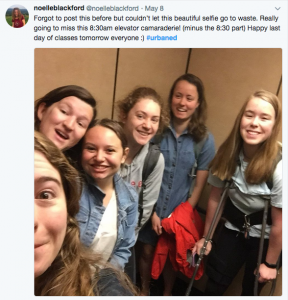Before taking this class, my discussions of urban education had never involved community organizing. I tended to view issues of urban education as isolated, contained within the school system. This semester I have come to see how organizing and education are more intertwined than I had previously thought. Education shapes organizing and organizing shapes education.
First of all, community organizing itself can be a form of education. Our study of Ella Baker helped me realize this. Baker practiced group-centered leadership in her organizing efforts. That is, she worked to teach communities skills so that they could eventually organize themselves around their common concerns. Developing the leadership potential in others, Baker organized with a strengths-based approach, much like many of the organizations I have studied in this project. She recognized the inherent strength in ordinary communities and developed it so that people within those communities could take the lead in creating change. With education at the heart of organizing, Baker’s method ensures that communities become self-sufficient, able to maintain their momentum. I admire Baker’s implicit faith that people can solve their own problems, if only empowered to do so. This faith is at the heart of good community organizing and education.
Not only is education part of the organizing process, but organizing is also central to bringing about changes to systems of education. Our class has studied a range of issues affecting urban public schools, from neighborhood violence and the racial academic achievement gap to inadequate funding and lack of culturally-competent pedagogy. Community organizing offers a way for those affected (and unaffected) by these issues to demand change and/or be involved in creating change. Organizing efforts are accessible to community members, offering a way for ordinary people to become leaders and change agents. And these efforts actually see results! We have seen countless examples of students, parents, and teachers whose efforts have led to tangible change in schools. March for Our Lives is a timely example of students demanding policy change and creating real conversation. It aligned with much of what we discussed in class. This project has further exposed me to the vast number of organizations working to create change in urban schools. In doing my project, I only focused on organizations that are currently working to improve Latino parent engagement in schools, and I still had trouble narrowing down the list. There are so many community organizing efforts doing incredible work. That gives me hope for the future of urban education.
Lastly, our class itself is a point of intersection between community organizing and education. Although it is very much a college class, it is also a community of sorts. I appreciated having the opportunity to get to know my classmates. From rushing up the stairs (or leisurely taking the elevator) to holding Twitter discussions, our class formed a real sense of belonging by the end of the semester. We share common interests, as any community does. We are all college students who have taken an interest in issues of urban education. Some of us have been personally affected by these issues. Some have not. We have not always agreed, as our heated debates about philanthrocapitalism show, but by sharing our different perspectives we have worked together to develop a collective knowledge of issues of urban education. This class has also exposed me to various examples of organizing efforts around these issues. We have discussed different methods of organizing, and can dip into this knowledge for our own purposes. That is, while we cannot take action as a class, we are now well-equipped to use what we have learned about organizing to take action in meaningful ways on issues that we deem important.

Source: Twitter
As someone who hopes to be a public school teacher one day, this class has been valuable in illuminating ways that I can bring principles of community organizing into the classroom, and simultaneously involve myself in community organizing efforts outside of the classroom. Organizing has shaped my learning in this course, giving me a lens with which to examine urban education. At the same time, my education from this course now enables me to go forth and take part in organizing efforts. Better yet, I have a community of classmates to join me. Thank you for a great semester!
